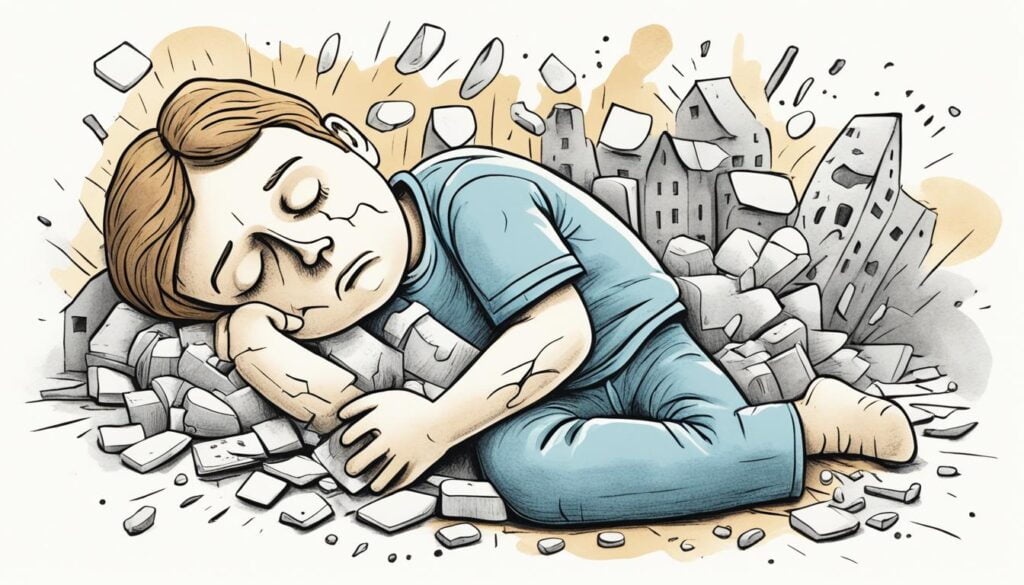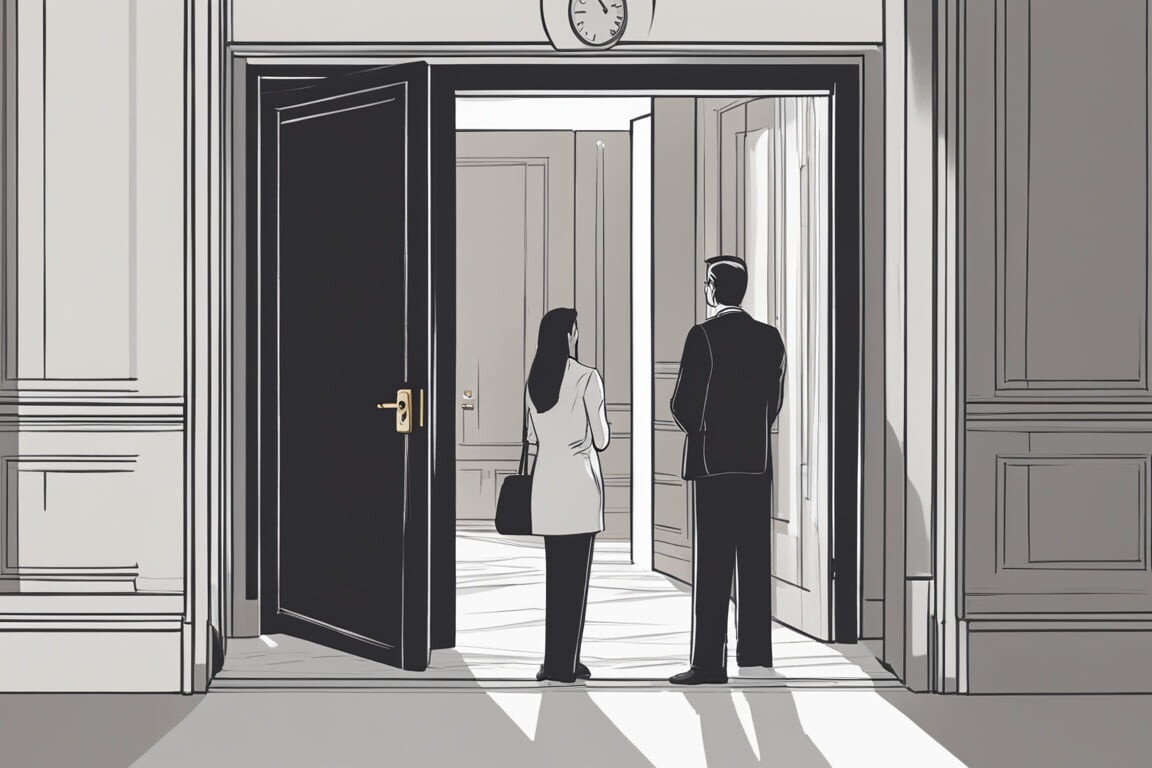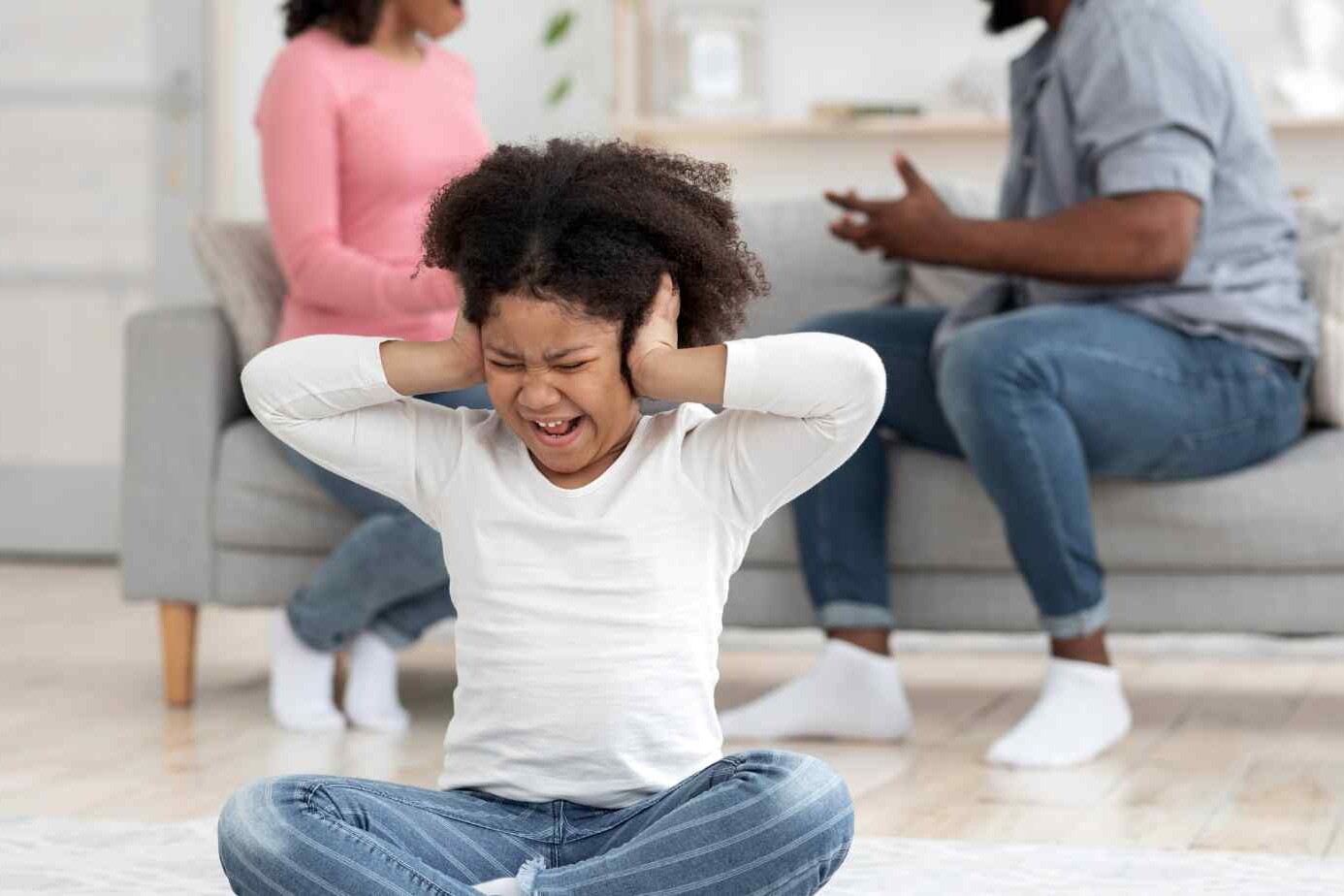Almost everyone faces trauma at some point in their lives. But what happens when this trauma hits us as kids? Does it keep affecting us as adults? The answer is “yes.” Childhood trauma can have lasting effects that stay with us into adulthood.
These effects can vary from person to person. But getting help from a professional is key to dealing with them. Knowing how trauma affects us can also help us move forward.
Childhood trauma, or adverse childhood experiences (ACEs), deeply impacts our health and well-being. It can lead to physical and mental health issues that last into adulthood. By understanding these effects, we can work towards healing and recovery.
Table of Contents
ToggleWhat is Childhood Trauma?
Childhood trauma is when bad events happen before you grow up. These events can hurt your body, feelings, and mind. They are called adverse childhood experiences (ACEs). Each person reacts differently to these experiences.
Four Main Categories of Adverse Childhood Experiences (ACEs)
A study by the Centers for Disease Control and Prevention (CDC) found over 60% of adults have had at least one ACE. About 16% have faced four or more. The more ACEs you have, the bigger the impact they can have on you. ACEs are grouped into four main types:
- Abuse (physical, verbal, emotional, and sexual)
- Neglect (physical and emotional)
- Household Challenges (parent divorce, separation, death, or abandonment; poverty or homelessness; seeing physical or emotional abuse; substance abuse or mental illness in the family; serious accidents or illness of a loved one; losing a pet or loved one)
- Community Incidents (natural disasters, terrorism, community violence, school violence, or being left out)
Knowing about the different kinds of childhood trauma helps us understand its effects. It also helps us work towards healing.
Not Everyone Experiences Long-Term Effects
Childhood trauma can have big effects, but not everyone stays affected for a long time. Many things can make a person more or less resilient to trauma’s effects.
Five Major Influences in Childhood Trauma
- Severity of the Trauma: The more severe and long-lasting the trauma, the bigger the impact. Abuse, neglect, or repeated violence has a big effect.
- Proximity to the Trauma: Trauma close to you or directly involving you hits harder than distant or secondhand events.
- Caregiver Response: How caregivers act during and after trauma affects the child’s recovery. Supportive actions help build resilience.
- Previous Trauma Exposure: People who’ve faced many traumas or had a traumatic brain injury might be more at risk for lasting trauma effects.
- Community Support: Having access to help, therapy, and a strong support network is key in overcoming childhood trauma.
Knowing these factors helps us see how to build resilience to childhood trauma. This can lessen the chance of long-term harm.
Health Risks Associated with effects of childhood trauma
When you go through a traumatic event as a child, your body gets a lot of stress hormones. These hormones can affect your health for a long time. People who have faced trauma early in life are more likely to get serious health problems later.
The effects of childhood trauma on health can be very bad. Studies show that those who had a tough childhood are more likely to get heart disease, diabetes, cancer, stroke, obesity, and addiction. These long-term health effects of childhood trauma can really change how you live and how long you live.
Childhood trauma can make your body stay in stress mode, leading to chronic inflammation and system problems. This can up your chances of getting chronic illnesses like the ones mentioned. It’s important to know how physical health effects of childhood trauma work and get the right treatment to lessen these effects.

Fixing the physical health effects of childhood trauma needs a mix of therapy, changing your lifestyle, and sometimes medical help. By understanding how early adversity affects your health, you can start to heal and better your health for the future.
Emotional Risks of Childhood Trauma
Childhood trauma can deeply affect your emotions and mental health. If you went through a traumatic event as a child, it might be hard to handle stress. This can lead to ongoing emotional and psychological issues, like the emotional effects of childhood trauma and psychological effects of childhood trauma.
One big emotional impact is memory loss. Your brain might block out the traumatic event to protect you. This makes healing and processing the trauma hard. Other emotional risks include:
- Anger and aggression
- Anxiety and fear
- Lack of trust in others
- Low self-esteem
- Changes in appetite
- Development of new phobias or fears
- Increased thoughts about safety or death
- Loss of interest in previously enjoyable activities
- Self-destructive behaviors
- Suicidal ideation
The emotional effects of childhood trauma can greatly affect your life. It’s crucial to get professional help to deal with these issues. With the right support, you can overcome the psychological effects of childhood trauma and regain your emotional strength.
Environmental Risks from Childhood Experiences
Childhood trauma affects more than just your mental and physical health. It also impacts your relationships, career, and daily life. Emotional ups and downs from tough times in childhood can make it hard in your close relationships, with friends, and at work. The social and environmental effects can also make it tough to keep a steady routine, do everyday tasks, and perform well in school or work.
Childhood trauma can really change how you connect with others and handle daily life. Trouble with emotions, staying focused, and trusting others can lead to tough relationships and struggle in different areas of life. This can make things even harder, creating a cycle that’s hard to get out of.
Getting help from professionals and trying therapies based on solid research is key to dealing with these risks. By tackling the deep causes and learning new ways to cope, you can get better and take back control of your life.
Childhood Trauma Impacts Brain Development
Childhood trauma deeply affects the brain and nervous system’s development. Stress can slow down the brain’s growth. Without enough mental activity, the brain may not fully develop.
Children who have faced trauma might often feel pain, like headaches or stomachaches. As adults, they could have more health issues. This shows how trauma in childhood can affect us later.
Childhood trauma changes the brain’s stress response. This can lead to mental health problems, such as PTSD, depression, and addiction, later on.
It also makes it hard to control emotions, process information, and build strong relationships. These effects can last into adulthood. It’s important to help those who have gone through this.
If you or someone you know has been through childhood trauma, getting help is key. With the right support, healing is possible. This can lead to a better life.
Therapy for Healing Childhood Trauma
Healing from childhood trauma means using a therapy that understands “what happened to you.” Your therapist will make sure not to make things worse for you. This approach focuses on your past to help you move forward.
There are proven treatments that help with the lasting effects of childhood trauma. These include:
- Cognitive Processing Therapy (CPT): This therapy helps you change negative thoughts and beliefs from your past.
- Trauma-Focused Cognitive Behavioral Therapy (TF-CBT): This therapy combines cognitive and trauma-focused methods to help you deal with your memories.
- Eye Movement Desensitization and Reprocessing (EMDR): EMDR uses eye movements to help your brain process and lessen the impact of traumatic memories.
- Somatic Therapy: This therapy focuses on your body to help you feel connected and in control of your physical sensations, which trauma can affect.
Working with a therapist who knows about trauma and using proven treatments can help you heal from childhood trauma. This is a step towards recovery.
Dissociation and Complex Trauma in Children
Children who go through scary and overwhelming events might use dissociation to cope. Dissociation means mentally stepping away from a traumatic event. It deeply affects a child’s growth and well-being, especially if they’ve faced complex trauma.
Complex trauma means going through many, long, or personal traumatic events. Dissociation in kids can make it hard for them to be fully in the moment. It can also mess with their sense of time and how they connect with others.
This can cause problems in school, making it hard to make friends and learn. Kids might act differently in class or struggle to connect with others.
It’s important to understand how dissociation in childhood trauma and complex trauma in children are linked. This helps in giving the right support and help. By seeing the signs of dissociation and dealing with the complex trauma, those who care for the child can help them cope better.
With trauma-informed therapies, counseling, and a caring environment, kids can deal with complex trauma and dissociation. The right support and tools can help them move past their past and do well in life, school, and with friends.
Attachment Issues from Adverse Childhood Events
Childhood trauma can deeply affect how we form relationships later in life. If a child goes through abuse, neglect, or loses a caregiver, they might struggle with attachment issues as adults. These issues make it hard to trust others, manage feelings, and deal with romantic relationships.
Children who face trauma learn they can’t count on their caregivers for emotional support. This leads them to believe the world is dangerous and people can’t be trusted. This belief makes forming close relationships hard, affecting both personal and work life.

Also, trauma in childhood can lead to relationship challenges. People may find it tough to express feelings, set boundaries, and solve conflicts. This can cause a pattern of broken relationships and more emotional pain.
But, there’s hope. There are therapies and support that can help those with attachment issues from childhood trauma. By tackling the trauma and learning new ways to cope, people can start to trust others and build strong connections.
Conclusion
The effects of bad experiences in childhood can be tough, but you’re not alone. A skilled therapist can help you understand, deal with, and heal from your past traumas. It’s never too late to take control of your life and aim for a brighter future.
Healing from childhood trauma might seem hard, but with the right help and steps, it’s possible. This healing lets you live a more meaningful and true life. Every day is precious, and moving forward in your recovery shows your strength and resilience.
If you’re ready to start healing from childhood trauma, find a professional to help you. They can guide you through your past and give you the tools to beat the lasting effects. Your happiness and well-being are important, and with the right support, you can take back your life and enjoy it fully.
FAQ
What are the long-term effects of childhood trauma?
Childhood trauma can lead to serious health issues, emotional and psychological problems, and environmental challenges. It can affect a person’s life deeply.
What are the four main categories of adverse childhood experiences (ACEs)?
ACEs include Abuse, Neglect, Household Challenges, and Community Incidents. These are: physical, verbal, emotional, and sexual abuse, neglect, family problems, and witnessing violence or abuse.
What are the five major influences that can determine the impact of childhood trauma?
The impact of trauma depends on: how severe the event was, how close you were to it, your caregivers’ reaction, if you had past trauma, and community support or backlash.
What are the physical health risks associated with childhood trauma?
Trauma in childhood can lead to heart disease, diabetes, cancer, stroke, obesity, and addiction.
What are the emotional and psychological effects of childhood trauma?
Trauma can cause anger, anxiety, and a lack of trust. It can also lead to low self-esteem, new fears, and self-destructive behavior.
How can childhood trauma impact one’s environment and relationships?
Trauma can make adult relationships and work challenging. It can also affect daily routines and academic performance.
How can childhood trauma impact brain development?
Stress and neglect can harm brain development. Lack of mental stimulation can limit the brain’s full potential.
What are some evidence-based treatments for healing from childhood trauma?
Effective treatments include cognitive processing therapy, trauma-focused cognitive behavioral therapy, eye movement desensitization and reprocessing, and somatic therapy.
How can dissociation and complex trauma affect children?
Dissociation can make it hard for children to be fully present. It can also affect learning, classroom behavior, and social skills.
How can childhood trauma impact attachment and relationships in adulthood?
Trauma can make it hard to trust others. It can lead to believing the world is scary and people are dangerous. This makes forming relationships challenging in both childhood and adulthood.
Source Links
About The Author

This article is medically reviewed by Dr. Chandril Chugh, Board-Certified Neurologist, providing expert insights and reliable health information.
Dr. Chandril Chugh is a U.S.-trained neurologist with over a decade of experience. Known for his compassionate care, he specializes in treating neurological conditions such as migraines, epilepsy, and Parkinson’s disease. Dr. Chugh is highly regarded for his patient-centered approach and dedication to providing personalized care.
→ Book a consultation to discover which remedies suit your needs best.




